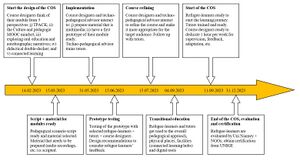Certificate-of-Open-Studies
Certificate of Open Studies
Introduction
The Certificate of Open Studies (COS) is a new format offered by the Centre for Continuing and Distance Education of the University of Geneva (https://www.unige.ch/files/3415/8271/1574/Statut-20fevrier2020.pdf, art. 65). A COS in Education in emergency contexts will be offered in 2023 and this page centralises some resources.
It relies on Openness, Open Education and Open Science, using Open Educational Resources.
Overall design
The COS design, in its first edition, is starting this month of February. It is conceived as a design-based research, with the intent of starting with a first edition that is progressively fine-tuned.
Timeline COS 1st edition design
Basics for course designers’ start: Key pedagogical concepts
TPACK
Technological, pedagogical and content knowledge. Course designers are asked to watch this 5 minutes video to get introduced to TPACK https://www.youtube.com/watch?v=yMQiHJsePOM and then read this article by Koehler et al. (2013), What Is Technological Pedagogical Content Knowledge (TPACK)? The Journal of Education, 193(3), 13-19. http://www.jstor.org/stable/24636917 . Course designers are then invited to reflect, for their module, which CK, PK, TK and intersecting knowledge is needed. The output can take the form, for example, of a concept map (see p. 71 of https://doi.org/10.3917/raised.021.0061 ).
Didactical double-decker
This is a concept I have discovered at PHZH, during LECU and SINAN projects, that relate to using material, i.e. Lehrplan 21, in teacher training that learners will use in the classroom when they are teachers. This "link" provides a context for how to use a resource both in the positions of the learner (at PHZH) and in the position of the teacher (in classroom). In the COS it is not about using the content in both places but rather about using pedagogical strategies and digital technologies that participants will seamlessly be able to use as educators (e.g. whatsapp similar but open). Course designers are invited to remember this in their design.
Cultures and pedagogies as a mindset
The variety of cultures and pedagogies and what they can leverage is the background framework in terms of values of the COS design. Course designers are invited to make sure that they fully understand the following resources: MOOC Cultures et Pédagogies ; Repenser l’éducation : alternatives pédagogiques du Sud (Akkari & Fuentes, 2021) ; Repenser l’éducation et la pédagogie dans une perspective africaine. Akkari, A., Gandolfi, S., & Sagayar, M. (2022). Globethics.net.
Oral education
Course designers need to be well informed of pedagogies of the Souths and read at least Freire’s Pedagogy of the Oppressed and the resources mentioned above, in the Cultures and pedagogies as a mindset section.
Connected learning
This concept refers to several connections, well beyond the internet. Basically, it foregrounds a personal interest and multiple connections and supports spreading from this interest to make it grow. Course designers are invited to watch this 18 mn video (specifically from minute 8 onwards) and read some of this resource by Ito, M., & Colleagues. (2020). The Connected Learning Research Network: Reflections on a Decade of Engaged Scholarship .
Empowering learners
In the Middle Ages, when European universities started, especially in the Bologna model (and we are in the Bologna reform since 1998), learners decided what they wanted to learn and which courses teachers should teach them. In the COS, course designers are invited to take into account participants’ conceptions, interests, knowledge and real needs with regard to a module content. To do so, strategies to prompt participants about their reality, their expectations from this COS, assignments in the form of autobiographic narratives, etc. are to be used regularly. Ideally, and in the longer term, participants should be free to choose a customised path according to their interests and be free to use the language of their choice to complete assignments, especially those oriented towards autobiographic narratives.
Overall framework
- Refugee-learners’ local languages are mainly Haussa, Zarma, Fulfulde and Kanuri and they should be free to produce assignments in those languages.
- Education in emergencies and Open Education represent the overall context. They can enter in tension at some points and in case this happens, the security of refugee-learners guides actions.
- Open Educational Resources (OER), Open platforms and open smartphone applications are to be used with regard to infrastructure, e.g. Graasp for OER.

